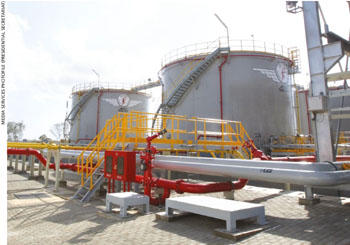OIL MARKET
A RECALIBRATION OF PRICE
Praveen Jaiswal describes the forces driving the supply and demand of oil

This part of the story is always left out. When Alice fell down the rabbit hole, she yelled: ‘Catch me, I’m falling.’ The white rabbit replied: ‘It’s okay Alice, sometimes we need to fall.’ And that’s precisely what has happened with oil prices lately.
Those who wear spectacles would be familiar with the feeling of having lost them. You search the house, blame the kids, and check the fridge and car but cannot find them. So you conclude that you’ve lost them and buy another pair… and a spare pair just in case.
You then arrive home only to realise they were on your head all along! Well, that feeling is how the market reacts to tailor-made news – be it OPEC production cuts, or inventory or job data – to rally oil prices.
According oil economist Daniel Yergin, “a great struggle is unfolding in the world oil market. On one side are forces pushing to rebalance supply and demand; and on the other, those pulling to recalibrate the business so that it operates at a lower cost. That tension explains why the price continues to jump… and then fall back.”
Earlier, Saudi Arabia was clear that there would be no output cut out of fear of losing market share. Now with declining oil revenues, OPEC members have joined hands once again to cut output to increase oil prices and bring the market into balance.
But since then, there’s been no sign of an oil price recovery. Rebalancing is now colliding with recalibration. This recalibration of prices is causing massive adjustments and reshaping the way the global oil industry works.
The good news is that lower oil prices have forced producers to review their cost of production. And this has led to a cost recalibration.
Reports indicate that Canada’s oil sands now produce a barrel of oil for around US$ 50. In Russia, costs have declined by over 50 percent. Even deep-water offshore can now produce oil at less than 50 dollars a barrel whereas in the past it cost US$ 75. This recalibration is pushing supply upwards and nullifying the effects of production cuts by OPEC members.
Economists are now predicting that in real terms oil will be free in three years.
That simply makes no sense given the importance of oil to nearly every economic activity. However, a few developments may make this a reality: no more petrol or diesel cars, buses or trucks will be sold anywhere. The entire market for land transport will switch to electrification, leading to a collapse of oil prices and the demise of the petroleum industry as we know it.
This is the futuristic forecast by Tony Seba whose premise is that people will stop driving altogether – i.e. they will switch en masse to self-driven electric vehicles that are 10 times cheaper to run than fossil-based cars with a near-zero marginal cost of fuel and an expected lifespan of 1.6 million kilometres.
Tesla Motors is working on models that have only 18 moving parts, 100 times less than a prevailing internal-combustion engine car, leading to almost zero maintenance and no emissions.
Recently, India and China said they planned to have all-electric car fleets by 2030 with the express objective of reducing their fuel import bills and the running cost of vehicles. The idea is mooted not only in the context of saving on import costs but also driven by environmental concerns.
Big cities are choking on smog and traffic jams. People around the world want to stop burning oil so their children can breathe easier; and it is to this trend that governments are responding. India and China are rapidly shifting to electric vehicles for the same reason.
This is a case of the people demanding change rather than government attempting to enforce it. Following years of allowing people to pollute freely in the name of ‘economic development,’ governments are listening to their subjects complain about their children growing up with asthma and other respiratory diseases.
Seba predicts that the long-term price of crude will fall to 25 dollars a barrel. Most forms of shale and deep-water drilling will no longer be viable. So related assets will be stranded. Scotland will forfeit any North Sea bonanzas while Russia, Saudi Arabia, Nigeria and Venezuela will be in trouble.
This is an existential threat to the motor industry. The next generation of motorcars will be ‘computers on wheels.’ The tipping point will arrive in the next few years with advancements in battery technology drastically lowering costs, and making way for convenience and efficiency.
All this is happening more rapidly than OPEC had assumed. Last year, it dismissed electric vehicles as a fringe curiosity that would make little difference to the ever-rising global demand for oil. It implicitly treated the Paris Agreement on climate targets as empty rhetoric. Oil exporting states are now caught in a squeeze.
And Seba warns of a Minsky moment: if we do not prepare in time, the energy revolution will move so rapidly that it’ll precipitate a global financial crisis.




